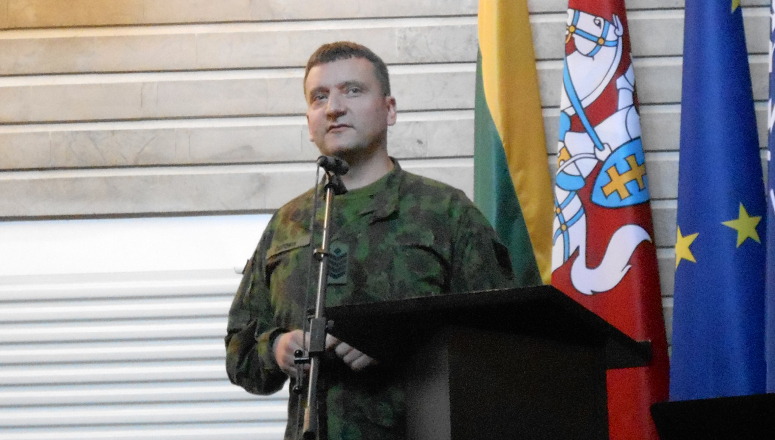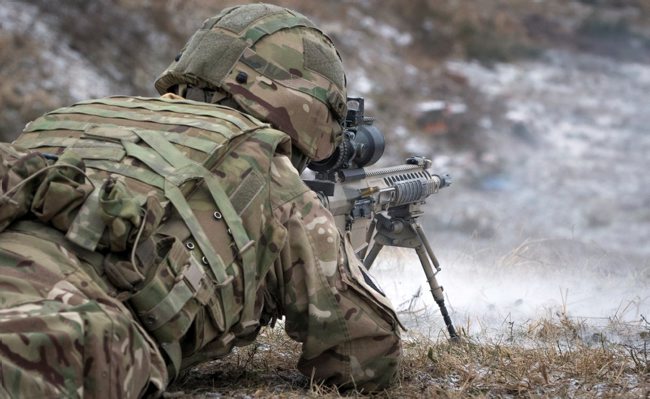
The West Must Strike Back Against Russian Disinformation, Says Lithuanian Expert

Cover: Sergeant Tomas Ceponis during a presentation in Vilnius earlier this month (Picture: NATO).
The West needs to strike back against Russian disinformation and propaganda, with action needed now more than ever, a Lithuanian information warfare specialist has said.
Sergeant Tomas Ceponis of the Lithuanian military's Strategic Communications Department (SCD) said there are plenty of legal, political and economic tools available.
He revealed that the unit has been working with its British Army counterpart, 77 Brigade, since they first met in 2016 - undertaking regular meetings to share intelligence and techniques.
The SCD has been on the frontline against reported Russian disinformation and propaganda since 2009, with Sgt Ceponis describing 77 Brigade as doing an "outstanding job":
"The situation in (the) West information environment does not need to be the new normal.
"The West needs to strike back - there are a lot of legal, political, economic tools at its disposal.
"Actions are needed now more than ever, otherwise Russia will continue to offend. If the allies display a hard and decisive tone, it will convey a stabilising message."
Amid increasing tensions between the Kremlin and the West, last month the head of MI5 Andrew Parker warned that "age-old attempts at covert influence and propaganda have been supercharged in online disinformation".
He said Russia waged a war of disinformation after the nerve-agent attack on former spy Sergei Skripal and his daughter Yulia earlier this year - promoting 30 explanations for the poisoning.

It comes as British troops deployed in Eastern Europe as part of NATO's enhanced Forward Presence (eFP) have been targeted by disinformation, and soldiers have been ordered to remove the SIM cards from their mobile phones (Picture: Ministry of Defence).
With regular meetings and the ability to do "quick mutual consultation" as required, Sgt Ceponis said his comrades continue to share information with 77 Brigade on the situation in Lithuania.
The kind of influence and impact Russia has on operations in the Baltic state, including their methods, tactics, audiences, tools and frequency; and what they are doing to counter Kremlin disinformation and propaganda, have also been discussed.
77 Brigade was formed in 2015 by Brigadier Alastair Aitken. He has previously described how the unit works to "counter the campaigns of regimes that use disinformation to create war zones".
NATO has four multinational battlegroups in Eastern Europe. They are led by Britain in Estonia, Canada in Latvia, Germany in Lithuania and the United States in Poland - established to deter potential aggression from the Kremlin following the annexation of Ukraine in 2014.
Last year, the British Ambassador to Estonia warned that the UK deployment is as crucial to the security of Berlin, London and Paris as it is to the security of the Baltics:
Sgt Ceponis highlighted how earlier this month an incident involving the collision of a number of American Stryker armoured vehicles in Lithuania was twisted and turned into disinformation.
The crash saw 13 American soldiers suffer minor injuries after four vehicles hit each other, but Sgt Ceponis said it was turned into fake news which claimed a child had been killed.
Pretending to be from a legitimate news outlet, the article featured a photoshopped image of a Stryker, a twisted ruined bicycle and an injured figure in front of a policeman.
Sgt Ceponis said the story was immediately posted on social media, adding that sometimes when disinformation is shared through those channels it is "almost impossible to control".
It is understood British soldiers were also targeted with disinformation following Exercise Spring Storm last year in a story which claimed UK, Estonian and NATO forces were not able to train their soldiers.
They have also previously been ridiculed for giving out wristbands at a public event.
Lieutenant Charlie Byrd from 1st The Queen's Dragoon Guards, currently based in Poland, said the 150 troops there as part of the US-led battlegroup are "absolutely aware" there is a disinformation campaign going on, adding that it is not something to be feared.
Lieutenant Colonel Christian Wilhelm, who teaches at the NATO school and is currently deployed as part of the eFP German-led battlegroup in Lithuania, said disinformation is not something he expects to go away any time soon.
Asked whether this issue serves as a distraction during a deployment, he said it is not but is something taken into account:
"You worry about the weather, you worry about your opponent, you worry about the terrain, your own troops, the vehicles, lots of things.
"That is one additional thing that we are now covering. In the concept of the operations, that is one thing we watch, analyse and draw our conclusions from."
NATO spokeswoman Oana Lungescu said there have been many attempts to undermine alliance troops deployed to the region, including through disinformation and false allegations of criminal activity.
She confirmed the four battlegroups "share information and alert each other of false reports".









